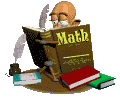
COURSE INFO
SYLLABUS
|
Math 260, Spring 2008Introduction to Higher MathematicsSyllabusCourse description: The course will serve as the basis for all upper level mathematics you will take at Whitman and beyond. We will be looking at many different proof techniques through exploring many different branches of mathematics. We will foreshadow some of the topics you will be covering in Abstract Algebra and Real Analysis, as well as studying the topic of Surreal Numbers in depth. Click here for a more detailed schedule. Goals: The primary goal of this course is to enable the student to find his or her mathematical voice, both in writing and in speaking. The topics covered are secondary to the aim of the course. They provide the venues through which you'll come to understand what makes for a clear, correct, and coherent mathematical argument. You'll notice early on that many of the assigned exercises are open ended, that is, you are presented with a statement that you don't know to be true or false a priori . Part of higher mathematics and mathematical discovery is fraught with this uncertainty, and you will be given a gentle introduction to it in this course. You don't learn to play football by reading a rule book, you learn by getting muddy in your backyard. The same statement applies to mathematics. In that light, my hope is for a very muddy semester. Instructor: Barry Balof Office: 236 Olin Hall Location: 221 Olin Hall Time: Monday, Tuesday, and Thursday, 9-9:50 Textbooks: Expanding the Frontiers of Mathematics by Edward Burger, Surreal Numbers by Donald Knuth
Homework: Homework will be posted here . Homework will be assigned daily and collected weekly. It is recommended that you attempt all problems assigned, not just those that will be collected. The homework assignments will serve as the basis for class discussion. Late homework will be subject to a significant, though not fatal, penalty. In addition, students will be responsible for leading the class discussions on Surreal Numbers throughout the semester. They will not only be responsible for discussing the previous night's reading, but for writing up the 'minutes' of the class discussion to use as the unit progresses. More details on this to follow. Tests: This class will have two exams, a take-home midterm as well as a final exam. The take-home exam will be 48 hours long and to be done in the week before spring break. The final will be scheduled by the registrar's office and may have both oral and written components. DO NOT PLAN TO LEAVE CAMPUS BEFORE THE FINAL. YOU WILL BE PENALIZED EITHER BY MYSELF OR THE AIRLINES.Grading: Grades will be assigned on a rougly 90-80-70 scale, with grades weighted as follows.
Academic Honesty: Homework for this class is to be done in partnerships. You will be assigned a partner based on compatibility of schedules and styles. Your only resource for homework assignments will be your partner. No outside materials, internet resources, or collaboration with other partnerships is allowed. Special Needs: Any student with a disability for whom special accommodations would be helpful is encouraged to discuss this with the professor as soon as possible. |
Barry Balof's Home Page
Whitman Math Home
Whitman College Home